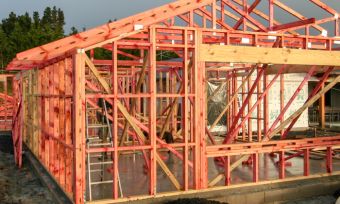Unless you’re Richie Rich, if you want to buy a home, you’ll need to apply for a home loan. And if you’re new to the property-buying game, it can seem overwhelming. However, if you know what you’re doing, and understand the steps involved, applying for a mortgage need not be complicated. Canstar’s easy guide has all you need to know about how to apply for a home loan:
In this article:
- What is a home loan?
- When do you apply for a home loan?
- How do you apply for a home loan?
- How hard is it to get approved for a home loan?
- What documents are needed when applying for a home loan?
- What happens after you apply for a home loan?
What is a home loan?
To buy a property, most people require finance from a bank or other lender. The home loan covers the difference between the buyer’s deposit and the purchase price of the property. A home loan, also called a mortgage, is the financial agreement a bank or other lender enters into with you that enables you to borrow the funds.
A home loan is typically for a set amount of money, which the borrower has to pay back to the bank over a certain amount of time. For example, 25 or 30 years. As a fee for the loan, the lender charges the borrower interest. This is a percentage of the funds borrowed, in addition to the principal (the borrowed amount). It also typically costs money to apply for a loan, in the form of upfront fees and extra insurance or a levy, if you’ve a low deposit.
It’s important to note that applying for a home loan is different from making an enquiry about a loan. The formal mortgage approval process involves supplying your chosen lender with documents and receiving an official notification of either conditional or final approval (discussed in more detail, below).
Lowest Mortgage Rates
The table below displays some of the 1-year fixed-rate home loans on our database (some may have links to lenders’ websites) that are available for home owners. This table is sorted by current interest rates (lowest to highest), followed by company name (alphabetical). Products shown are principal and interest home loans available for a loan amount of $500K in Auckland. Before committing to a particular home loan product, check upfront with your lender and read the applicable loan documentation to confirm whether the terms of the loan meet your needs and repayment capacity. Use Canstar’s home loan selector to view a wider range of home loan products. Canstar may earn a fee for referrals.
Compare Lowest Home Loan Rates for Refinancing
When do you apply for a home loan?
You can apply for a home loan either:
Before finding a home:
Some people choose to apply for a home loan before they’ve found a property to buy. This is called conditional approval or pre-approval, and can help a potential buyer understand how much they can borrow.
While pre-approval is not the same thing as formal approval, it can still be a useful first step for borrowers. By knowing your price limit upfront, it can narrow your search to properties you can afford. This can affect the types of dwellings you consider and their locations.
Pre-approval is essential when buying a home at auction. Winning bids at auction are usually unconditional and legally binding, and require a deposit to be paid immediately. So, before bidding, it’s crucial to have the necessary finance in place.
Typically, a bank will issue a pre-approved applicant with an official letter or statement that sets out how much they can borrow, and the conditions of the pre-approval, such as how long they have before it expires.
After finding a home to buy:
Some people wait until they’ve found a property to buy before approaching a lender for a loan. A real estate contract will typically include a “finance clause” (except for properties bought via auctions). This clause allows the seller and buyer to negotiate an agreement about how long the buyer has to obtain a home loan, and for the bank to settle it (give an assurance that the funds are available for the purchase).
If the buyer is unable to find a lender that’s willing to finance the purchase, the contract conditions will not be satisfied and the contract will be cancelled.
Paying a deposit and signing a contract without finance in place is risky, because the buyer is at risk of losing their deposit if they can’t arrange finance and settle the deal.
When purchasing a property, it’s a good idea to obtain advice from a suitably qualified professional, such as a trusted solicitor, before signing any contract.
How do you apply for a home loan?
There are two main ways to apply for a home loan:
- Directly to a bank – at a branch or online
- Via a mortgage broker
However, before doing either, it’s a wise idea to research what home loans are available on the market and what type of loan could suit your circumstances. There are many factors to consider when selecting the right home loan to apply for, including:
- Interest rates – points to check include whether the rate is fixed or variable, and whether it’s competitive with other rates on the market
- Features of the loan – considerations include whether the loan gives you the option of setting up an offset account or redraw facility, and whether you can vary payments easily or make extra lump-sum payments
- Duration (term) of the loan – this is important because longer term loans tend to have smaller monthly repayments but greater interest charges over the life of the loan. Can you reduce the overall cost of the loan by shortening the loan period and paying off more each month?
One way to investigate the home loan market is to use a comparison site, such as Canstar. Our home loan comparison tool allows you to easily compare rates and other product information. You can also filter the results to include or exclude certain features. This can help you narrow down your options and make a shortlist of lenders to approach about a loan.
Compare home loans with Canstar
How to approach a bank to apply for a home loan
- Start with your own bank: after researching the market to learn what’s on offer, it could be a wise idea to contact banks that you already have a relationship with, to ask them about their loans. Sometimes, lenders will offer special rates, deals or packages to existing customers. It’s also a good idea to ask them about deals that they offer to new customers, to see how they stack up against what you have been offered. Often, your bank’s online banking portal will have information on how to apply for a home loan and, typically, will have a special team that deals with home loans. It could also be possible to apply online, or receive pre-approval online. If in doubt, contact your bank directly.
- Contact the banks on your shortlist: after researching the market via Canstar’s comparison tool and making your shortlist, contact each lender about their application processes. It’s a good idea to start by enquiring online, so that you can receive greater detail about the application process and the loan’s conditions.
It’s important to note that each time you make a formal application for a loan, it’s recorded on your credit history. This could, in turn, impact your credit score, which can have an impact on your ability to borrow money in the future. So think carefully before making a formal application for a loan or for pre-approval.
However, typically, general enquiries – just asking lenders for information – are not recorded on a credit report. But, if in doubt, ask the lender.
How to use a mortgage broker to apply for a home loan
Mortgage brokers are service providers that sit between lenders and borrowers. They can negotiate a loan on behalf of a borrower, and organise paperwork and other requirements for the borrower. There are a large number of companies and individuals operating in this space. Educational qualifications and industry experience can differ widely between brokers, so make sure to enquire about a broker’s qualifications and experience before engaging their services.
A mortgage broker must be an authorised Financial Advice Provider. You can check their credentials at the Financial Market Authority’s website.
It’s important to note that mortgage brokers usually don’t offer the full range of home loans in the market. Most are bound to a certain set of lenders. Mortgage brokers make their fees in a number of ways. So always ask what commissions or fees they earn from lenders, in addition to any charges you might be required to pay.
Typically, a mortgage broker will talk to you about your needs and your financial circumstances, and help you to determine what loan or loans could suit you. The broker then goes to the lenders (typically the ones on their books) and creates a list of options for you to consider. Once you choose a loan, the broker generally handles the application process (although you will most likely have to complete a number of forms and supply all necessary information). The broker will then also co-ordinate the financial settlement of your purchase.
How hard is it to get approved for a home loan?
This depends on many factors, including:
- The size of your deposit
- How much you need to borrow
- Your repayment capacity
- The economic environment
What documents are needed when you apply for a home loan?
Different lenders require different documents. However, most lenders typically require some or all of the following:
Home loan document checklist
- Proof of identification – this will include a number of different types of ID, usually separated into primary and secondary ID. Primary ID usually includes a photo, such as a driver licence, or a passport. Secondary ID typically includes documents such as a birth certificate or marriage certificate. It could be a good idea to make sure you have:
- at least one form of photographic ID, and
- two or three secondary ID documents
- Proof of employment – this typically involves providing:
- recent payslips,
- and/or supplying bank statements of the account that your wage is paid into,
- and/or a letter from your employer (especially if you are a casual employee, have an irregular income or are paid for piecework)
- a lender can also ask to see tax returns (particularly if you are self-employed)
- Extra income and assets – this could include:
- bank statements
- share earnings reports
- KiwiSaver
- and any other proof of how your extra income is earned
- a list of assets, which could include a car or house that you own outright. If you are a landlord, you may also be asked to provide a copy of any lease agreements you have in place
- Expenses – most lenders will also want to see what you spend, such as:
- your household bills
- what you pay in rent,
- and to see your transaction account and credit card statements. If you are applying for a loan with a bank you use for most of your financial matters (such as transaction and savings accounts), they could source this information from your banking history
- if you are renting, your lender may also ask for the contact details of your property manager or estate agent
- Debts – the lender will most likely do a credit check,
- but will also require you to provide details of any loans you already have, such as car or personal loans
- What you want to buy or build – unless you are applying for pre-approval, the bank will need details of what you intend to buy or build. This is so the lender can perform a bank valuation (have its specialists take a look at the property to see if the amount you are paying is an acceptable risk to it).
- if purchasing, they need a copy of the signed contract of sale
- if building, they will need a copy of the construction contract and details of the land’s location and price.
- Insurance – some lenders may also require that you send them details of
- any insurance policies you may hold, such as life insurance or home and contents insurance
- Deposit or grant help – if you’re getting help with your mortgage, the lender could also ask for details:
- of your grant or KiwiSaver funds
- if someone is giving you money to boost your deposit. For example, if a relative is gifting you funds for a deposit, a lender may require a letter from that relative detailing the conditions of that gift or loan (such as if you have to pay it back)
- Conveyancer’s or solicitor’s details – the bank or broker will also need to know:
- who is doing your conveyancing – the legal work involved when buying a property. It could be a good idea to talk to your conveyancer about what level of involvement you need to have in the process, such as if you need to chase the bank or broker to find out if you have been approved, or if they will do that for you
As most loan approval processes are now handled online, it’s a good idea to have access to a document scanner or a smartphone with a high-resolution camera to allow you to send all documents to your lender or broker via email or their online application portals. It may be necessary, in some circumstances, to have a witness to your signature or copies of documents, such as a Justice of the Peace (the lender will likely have rules around this).
Usually, a lender will require documents presented in PDF format and photos in JPG (but they will let you know during the application process). Bank, share and KiwiSaver statements can typically be downloaded in PDF format from the organisations’ online portals.





Share this article